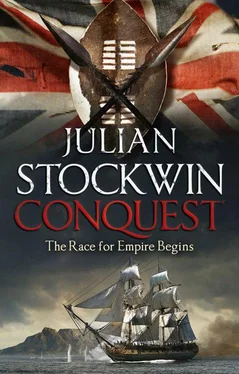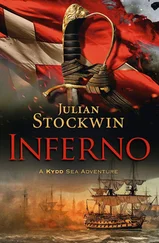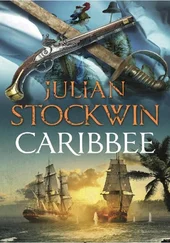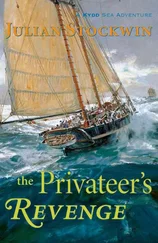Julian Stockwin - Conquest
Здесь есть возможность читать онлайн «Julian Stockwin - Conquest» весь текст электронной книги совершенно бесплатно (целиком полную версию без сокращений). В некоторых случаях можно слушать аудио, скачать через торрент в формате fb2 и присутствует краткое содержание. Жанр: Старинная литература, на английском языке. Описание произведения, (предисловие) а так же отзывы посетителей доступны на портале библиотеки ЛибКат.
- Название:Conquest
- Автор:
- Жанр:
- Год:неизвестен
- ISBN:нет данных
- Рейтинг книги:5 / 5. Голосов: 1
-
Избранное:Добавить в избранное
- Отзывы:
-
Ваша оценка:
- 100
- 1
- 2
- 3
- 4
- 5
Conquest: краткое содержание, описание и аннотация
Предлагаем к чтению аннотацию, описание, краткое содержание или предисловие (зависит от того, что написал сам автор книги «Conquest»). Если вы не нашли необходимую информацию о книге — напишите в комментариях, мы постараемся отыскать её.
Conquest — читать онлайн бесплатно полную книгу (весь текст) целиком
Ниже представлен текст книги, разбитый по страницам. Система сохранения места последней прочитанной страницы, позволяет с удобством читать онлайн бесплатно книгу «Conquest», без необходимости каждый раз заново искать на чём Вы остановились. Поставьте закладку, и сможете в любой момент перейти на страницу, на которой закончили чтение.
Интервал:
Закладка:
Her twelve-pounders would be of little deciding value against ships-of-the-line, and any other frigate-like service would be impossible with topmasts struck down – there was no alternative: he had to stay until they were a-taunt. But failing to sail in the presence of the enemy was a serious court-martial offence, and if the worst happened, an ignorant press would crucify him.
‘Sir! Sir! Look!’ The upper sails of a ship were close in on the other side of the point, the vessel about to put into Table Bay. And flying brazenly out was the tricolour of France.
It was a disaster. Not only had they been caught at anchor but the enemy had come from an unexpected direction, throwing them utterly into confusion. It was masterly timing, and if this was the first of the battle squadron, they had less than an hour to live.
Unexpectedly, a gun from Diadem drew attention to the next signal. The Blue Peter jerked down: Popham wanted the squadron to stay at anchor. Then the Dutch colours rose on the ensign staff and at the same time, along the ship’s side, the rows of bristling guns vanished as they were hauled in and the gun-ports shut.
Kydd quickly caught on: the commodore had reasoned that the ship that had been identified as an enemy had familiarly sailed close to the Cape peninsula because it was expecting Cape Town still to be in the hands of the Dutch. She was probably a stray from one of the battle-groups come to re-victual or repair. They would find out soon enough: if the ship shied away in alarm it would be proof, but then it would be free to draw down the rest of the French squadron. Unless . . . ?
The other British ships followed the flagship’s lead, but there was another gun – the Dutch colours on Diadem dipped, then rose again, a stern reminder to the castle ashore, which was slow in sending up a Dutch standard.
The French ship came into full view, a heavy frigate that made a show of hauling her wind as she swept around and, with a signal hoist flying, headed directly into the anchorage. Assured by the tranquil early-morning scene, with everything in place as it had expected – men-o’-war peacefully at anchor and with the colours of an ally floating lazily out from every vessel – the unsuspecting frigate made for the flagship.
Kydd held his breath: at any moment there could be the panic of recognition, a sheering away – but still it came on. Sailing by the first, a sloop, it pressed on, passing L’Aurore so close that individual sailors and the three officers on the quarterdeck could be seen plainly.
As far as Kydd knew no 64-gun ship was found in the French Navy and therefore Diadem would seem very Dutch to them – and, of course, L’Aurore , recently captured herself, had unimpeachable French lines.
The ship brought to opposite Diadem in a fine show. There was unbearable tension: any false move now and they would take fright. All now depended on Popham’s timing.
Every eye was on the stranger’s fo’c’sle – her bower anchor let go to plunge into the sea at the same time as her sail was taken smartly in. Unbelievably, it had happened.
And in an instant the Dutch colours were struck in Diadem . Watching for the signal, in every ship rows of gun-ports flew open and, with a deadly rumble, guns were run out in an unanswerable challenge.
It was check and mate.
Aboard the hapless ship, after a moment’s hesitation, the tricolour dropped down in short, angry jerks.
As nearest, and with a boat already in the water, L’Aurore was ordered to take possession. Out of consideration for the feelings of the other frigate captain, Kydd himself went, with Saxton and a file of marines.
As they approached he noted the weather-worn appearance of the vessel; this ship had kept the seas for months and therefore was almost certainly part of the feared battle squadrons. The loss of a frigate would be felt keenly.
He was first up the side, punctiliously doffing his hat to the quarterdeck and then to the group of officers standing rigidly awaiting him. ‘ Je suis le capitaine de vaisseau Thomas Kydd du navire de sa majesté L’Aurore . . .’
It transpired that the tight-faced captain was named Brettel and had the honour to command the French National Ship La Voluntaire on a peaceful voyage to Cape Town and wondered at the temerity of the English to act so in Dutch waters.
Kydd bowed extravagantly. ‘C apitaine Brettel, je suis désolé de vous informer que . . .’ It took only a few moments to tell the luckless man of the capture of Cape Town and therefore the necessity of relieving him of the command of La Voluntaire . He paused significantly. The man reluctantly unfastened his sword in its scabbard from his belt and presented it with a stiff bow. It was done.
Passing it smoothly to Saxton, Kydd nodded to Poulden, who went to the mizzen peak halyards and toggled on English colours above the French, hauling them up with a practised hand over hand. ‘And I’ll trouble you for the keys to the powder magazine,’ he added politely.
Sergeant Dodd took them and, with his corporal and two men, went below to mount guard. Then it was just the closing act. ‘Ah, it would oblige me, sir, should you accompany me to the flagship to meet our commander.’
Popham would get the sword but, much more importantly, he could speak with the man who knew where the battle squadron was. Saxton would have the sense to get below with the rest of the marines and confiscate any charts and papers he could find, and the French seamen would be landed to an inglorious captivity, all in an hour or so of arriving at what they thought would be a welcome run ashore.
Dodd returned hurriedly up the hatchway. ‘Sir! Mr Kydd, sir! There’s men below – English soldiers, an’ main glad they be t’ see us!’
The French captain gave a tired smile. ‘Taken in a transport. It was my intention to land them here – the reason we touched at the Cape.’
They started to come up from below, blinking in the sunlight, stretching and rubbing their limbs, in their dozens, scores – too many to count. Their rising joy was infectious as they laughed and shouted incredulously, and tried to shake hands with every Englishman they could reach, some weeping openly and a few staring gape-mouthed at the overwhelming sight of so many ships and the grand bulking of Table Mountain.
‘Er, Sar’nt Dodd – get those men into lines or something!’ Kydd chided, in mock indignation. This was an altogether unexpected bonus and at the very least a welcome addition to Baird’s forces.
‘And you’re welcome to that heathen beast we have below,’ the captain said sourly. ‘It took seven good men to put him in irons, no less.’
Kydd toyed with leaving the troublemaker for later but, in the general joy, decided to give him the benefit of the doubt. ‘Go below and see if he’ll come quietly,’ he told Dodd. ‘Any trouble and he stays.’
When the sergeant returned it was with a barrel of a Chinaman with fiery eyes and a scowl. Kydd recognised him instantly. ‘Ah Wong!’ He laughed delightedly. It had been many years but at one time he had been messmates with the circus strongman and seen his skill at scrimshaw.
Wong’s face showed suspicion and surprise, then creased into happiness. Hurrying across, he gave a respectful Oriental bow and touched his forehead. ‘Ah, Tom Kydd, sir! You now officer. Plissed to see!’
Aboard L’Aurore , Wong was overwhelmed when he found another old shipmate, Toby Stirk, there to greet him. Kydd soon found out what had happened: discharged from a broken-down man-o’-war in Sheerness, he had signed aboard a transport on the India run, which had had the misfortune to encounter the Willaumez battle squadron, and he had done his best to make known his displeasure at captivity.
Читать дальшеИнтервал:
Закладка:
Похожие книги на «Conquest»
Представляем Вашему вниманию похожие книги на «Conquest» списком для выбора. Мы отобрали схожую по названию и смыслу литературу в надежде предоставить читателям больше вариантов отыскать новые, интересные, ещё непрочитанные произведения.
Обсуждение, отзывы о книге «Conquest» и просто собственные мнения читателей. Оставьте ваши комментарии, напишите, что Вы думаете о произведении, его смысле или главных героях. Укажите что конкретно понравилось, а что нет, и почему Вы так считаете.









